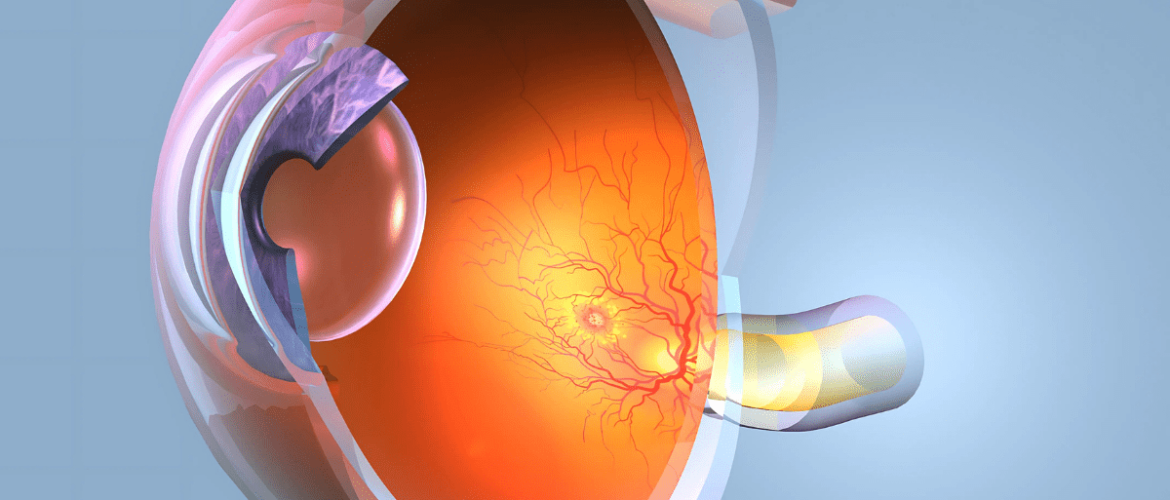The human body is made up of five senses that include vision, taste, smell, hear, and touch. Each of the senses is a combination of cells, nerves, blood vessels and more. The sensory organ eye gives us the power to see the world and the beautiful things around us.
What is Retina?
Retina is the nervous coat of the eye which is concerned with visual functions and is situated at the back of the eyeball. It is a structure which has abundant blood vessels, nerve cells and colour sensitive cells. It consists of two layers; the sensory retina which contains nerve cells that process visual information and send it to the brain; and the retinal pigment epithelium (RPE), which lies between the sensory retina and the wall of the eye.
There are many diseases that affect the retina. They can be local or systemic diseases, inherited and acquired. If undetected and not treated at the right time, retinal diseases may lead to loss of vision or blindness. Retinal diseases usually do not present with any pain
7 most important retinal conditions:
1. Diabetic Retinopathy
With an ongoing condition like diabetes, chances of the retina getting damaged is high. In this condition, the blood vessels of the eye (capillaries) degenerate and a fluid leaks into and under the eye. This leads to distortion of vision and swelling of the retina. It is usually diagnosed with the help of an opthalmoscope.
Management of diabetic retinopathy can be done through; Screening for diabetes, Urine and blood routine, Hemogram levels, by controlling diabetes and Laser therapy.
2. Hypertensive Retinopathy
When there is retinal vascular damage due to elevated blood pressure levels, it is known as Hypertensive retinopathy.
Management of hypertensive retinopathy can be done through controlling blood pressure levels and reducing cholesterol levels by making lifestyle changes.
3. Solar Retinopathy
Solar retinopathy is caused by the UV rays which are present in welding machines, infra-red rays and direct sun rays that cause it. Blurred vision, headache, central or paracentral scotoma, chromotopsia, photophobia, are few of the symptoms associated with this disease.
4. Retinoblastoma
Retinoblastoma is a malignant tumour of the eye that occurs in children when the cells of the retina, also known as retinoblasts grows uncontrollably. When the central aperture of the eye called pupil appears white and there is redness of the eye, the child needs to be taken to an ophthalmologist to rule out retinoblastoma.
Retinoblastoma can be managed through a surgical option called enucleation, chemotherapy or radiotherapy.
5. Retinitis Pigmentosa
Retinitis pigmentosa is a group of genetic diseases that affect the retina and cause the loss of night vision and peripheral vision. You need to check for symptoms like reduced night vision, loss of peripheral or side vision and blindness for this disease.
Management of Retinitis pigmentosa can be by following a low fat diet, gene therapy, vision rehabilitation and low vision aids.
6. Retinal Detachment
Retinal detachment is the separation of neurosensory retina from the pigment epithelium. This happens when the retina moves away from the normal position and separates the neurosensory cells from the layer of pigment cells. It can be caused due to some trauma or injury. If you experience appearances of black spots called floaters, flashes of light and decreased vision, it may be a case of retinal detachment.
7. Macular Degeneration
Macular degeneration is a condition happening usually with aged people and is called age related macular degeneration (ARMD) where the middle of the retina starts to deteriorate. Major symptoms include blurred central vision or a blind spot in the centre of the visual field.
Since it is age related it can be managed through taking anti VEGF drugs, laser therapy and photodynamic laser therapy.
Various other diseases affect the eye. Intake of systemic medications also affects your retina. Frequent regular evaluation of retina is necessary for individuals of all age groups for better eye health.


No comments yet.